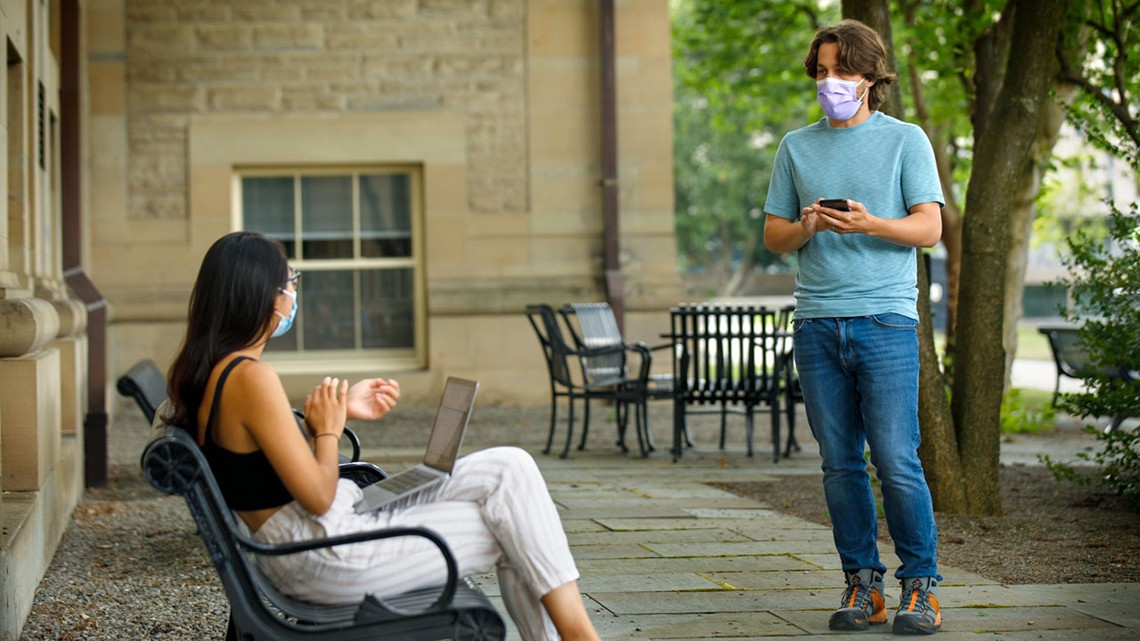
Bryan Maley, a graduate student in the Master of Public Health program, surveys a student on campus about her experiences wearing a mask.
Behavioral compact commits students to public health norms
By James Dean
Wearing masks, getting tested and other best practices for minimizing the spread of COVID-19 aren’t just recommended guidelines for Cornell students this year: They are behaviors they must formally agree to practice.
The university on Aug. 5 released the Cornell Student Behavioral Compact, which requires every student to attest that they will abide by federal, state, local and university public health guidelines, or face consequences.
“We must acknowledge the impact that this virus can inflict on our community and our shared responsibility to promote public health and to do all we can to protect those who are most vulnerable,” Ryan Lombardi, vice president for student and campus life, wrote in a message to students. “We all have an obligation to follow closely the standards articulated in the Behavioral Compact, and those who do not will be held accountable.”
To be eligible to enroll in classes, all undergraduate, graduate and professional students must complete a COVID-19 educational training course explaining the compact and rationale for it, pass a quiz and then formally attest that they have reviewed and understand the compact. Course enrollment is expected to open in late August for classes starting Sept. 2.
By accepting the compact, students agree to practice science-based behaviors that Cornell plans to reinforce through a public health campaign. Those include following university policies on face coverings and physical distancing and completing the Daily Check, an online assessment of health symptoms.
Students also commit to participating in a mandatory testing program the university has already begun in partnership with Cayuga Health System and the Tompkins County Health Department. Students will be screened for COVID-19 upon arriving in Ithaca and as often as twice weekly, for undergraduates, throughout the fall. The compact requires students to follow program protocols for entering isolation or quarantine after a positive test and to participate in contact tracing conducted by the health department.
The compact details required behavior in classrooms as well as at events hosted by organizations or in social settings on and off campus. Students agree only to participate in in-person gatherings of fewer than 30 people, while wearing masks and at staying least six feet apart.
Finally, students agree to limits on travel, including not inviting family or guests to campus; following state and university limitations on nonessential travel; and complying with health agencies’ testing and quarantine requirements when travel is necessary.
The need for the compact is twofold, said Vijay Pendakur, the Robert W. and Elizabeth C. Staley Dean of Students. First, it provides a clear blueprint for the behavioral norms expected this fall, which represent a challenging shift from last year.
“Many norms of how we interact with one another and how we operate within buildings and outside are going to be different, and what teaching and learning looks like is going to be different,” Pendakur said. “Because we are requesting a dramatic alteration of behavior, it’s important that we offer people an easy-to-follow and transparent blueprint.”
Second, he said, the compact serves as a tool for accountability.
“We take the compact very seriously as an institution,” Pendakur said. “We know that if students live their best Cornell values and take care of one another as a caring community by following the guidelines in the compact we will be a safer community.”
The Office of the Dean of Students will oversee the Cornell Compact Compliance Team, which will investigate reports of noncompliance submitted by students, faculty, staff or community members through an online tool now in development.
The compliance team’s decisions cannot be appealed, according to the compact. Instances of “severe, pervasive and/or repeated violations” could result in separation from the university.
“Disciplinary consequences will be nuanced and contextual,” Pendakur said, “but will also be quite serious for people who demonstrate a flagrant disregard for the safety of our community.”
Beyond disciplinary consequences, the compact requires students to acknowledge that Cornell cannot eliminate the risk of contracting COVID-19 despite the many precautions being taken, and that a virus outbreak could force the university to revert to entirely remote learning.
“I very much believe that we will, collectively, make our well-being a priority as we begin this year under exceptional circumstances,” Lombardi wrote. “Cornellians have, in times of crisis, always come together, and we need to do so now more than ever.”
Lombardi and other leaders will host a forum at 6 p.m. Aug. 6 to discuss the behavioral compact in more detail and answer questions from students and parents.
Media Contact
Get Cornell news delivered right to your inbox.
Subscribe